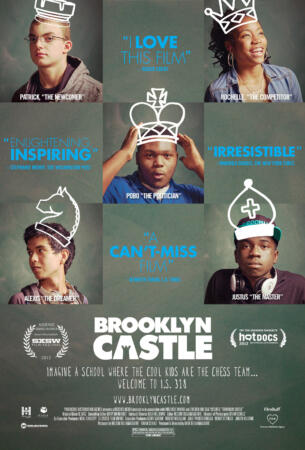
Directed by Katie Dallamaggiore, at the center of “Brooklyn Castle” is I.S. 318, an inner-city public school that’s home to the most-winning junior high school chess team in the country. But a series of deep public school budget cuts threaten to undermine its hard-won success. It’s an absolutely wonderful feature documentary filled with touching, inspirational stories of hope, ambition and perseverance.
In a climate in which “escape” film narratives of youth from working class families and under-represented groups – in this case, black and Latino kids – are dominated by stories in which athletic ability is option number 1 as a means for that escape from socio-economic oppression, the tension-filled intellectual drama that plays out in “Brooklyn Castle” is most refreshing.
You will be moved by the individual stories of these pre-teen and teenage boys and girls from I.S. 318 (an inner-city school where an overwhelming number of students are from homes with incomes below the federal poverty level) who’ve invested and sacrificed so much to master the game of chess (some of them would rank above Albert Einstein if he were to join the school’s competition team, as is said in the film), that you simply can’t help but root for them to succeed and reach their individual goals, that range from just simply getting into good colleges in the short term, to running for president in the long term.
And you are absolutely convinced that they can and will achieve those aims, if only based on the academic aptitude, confidence and conviction on display here from each.
Their parents, who’ve recognized, nourished and also sacrificed for their children’s’ talents, are to be commended here as well for what should be obvious reasons.
Four years in the making, there’s a broader narrative in “Brooklyn Castle,” and that is the economic crises which led to unprecedented public school budget cuts that jeopardize primary school education, and specifically, the after-school programs like that which is at the center of the film, and how the potential absence of that necessary funding could drastically affect the lives of the children who rely so heavily on them for sustenance.
It’s exhilarating and inspiring to watch the film’s 5 kid stars handle immense pressure (the kind of pressure that men and women decades older would likely be crushed under) and thrive; one possesses a natural gift for chess, and at just 11 years old (Justus), has been selected to join the US Chess Federation’s All-American team; and another, the sole girl in the group (Rochelle), who’s on her way to becoming the first African American female chess master in the history of the game at just 13 years old.
They’re forced to mature much sooner than their peers, and, in my humble opinion, will likely go on to become leaders of tomorrow.
But they’re still very much children, and the wounds of a loss sting as it only could for a child; while the thrill of a win is felt just as deeply, except tears are replaced with magnificent, infectious smiles, which only reinforces for the audience the importance of I.S. 318’s after-school chess program, and others like it – vital for not only the students, but for the schools.
Soon after the film premiered at the SXSW Film Festival in 2012, Sony Pictures and producer Scott Rudin (“Searching For Bobby Fischer”) purchased the remake rights to “Brooklyn Castle.” No word on where the project stands, or if it’s even still alive. But before that scripted remake happens, you should check out the original documentary which I just watched for the first time; it is available on various home video formats – DVD, VOD, Digital, etc. Even if you’ve already seen it, it’s a film worth revisiting.
Watch the documentary’s trailer below:

